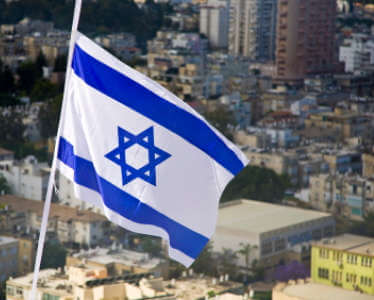
Islamic Jihad, a Middle Eastern terrorist group, claimed responsibility for Thursday’s rocket fire. However, Israeli Defense Minister Ehud Barak said the nation holds Hamas, a Sunni Muslim extremist group that won free elections in the Gaza Strip in 2006, responsible. Hamas said it wants to “restore calm” and would not attack. And Israeli’s Prime Minister Benjamin Netanyahu has made it clear that the nation will not be passive about terrorism.
Terrorism is nothing new to David Rubin, former mayor of Shiloh, Israel. Rubin was driving home from a dentist appointment with his three-year-old son, Ruby, when Palestinian terrorists opened fire on the vehicle just outside Ramallah many years ago. One tracer bullet hit Rubin in the leg. Another hit little Ruby in the back of the head. Doctors said surviving the drive-by shooting was a miracle.
Charisma magazine caught up with Rubin, author of the Islamic Tsunami, to get his perspectives on what these new attacks against Israel mean in light of the unrest in the Middle East and whether or not Israel should prepare for war.
Charisma: What’s your reaction to Wednesday’s terrorist attack in Jerusalem?
Rubin: It was bound to happen sooner or later. The Israeli army reserved the right to enter all of the Palestinian autonomous cities whenever necessary and has been doing that. Therefore, the Palestinian’s ability to create bomb and weapons factories has been greatly reduced. As far as launching terrorist attacks, that makes it a lot harder.
Charisma: But that has changed with the revolution in Egypt. The border between Egypt and Gaza is no longer as secure. So what’s the reality?
Rubin: Israel is a little country the size of Delaware. We can’t afford to look at situations through rose-colored glasses. We have to recognize the reality for what it is. What we see all around us is a continuation of the Islamic revolution. The question in the Islamic world is, who is going to head the Islamic tsunami? Will it be the Sunnis of Saudi Arabia or the Shiites as represented by Iran? That is really what is going on in the Middle East today.
Charisma: How much of the timing of the terrorist attack in Jerusalem is connected with the Egyptian revolution?
Rubin: It’s a continuation of the extremism in the Islamic world. The Islamic terrorist groups in the Islamic world gain popularity by how many terrorist attacks they are able to carry out. So the efforts are clearly going to be there more and more.
It didn’t make the news in a lot of places around the world, but there was an Israeli family in Samaria that a little over a week ago, on Sabbath night, had terrorists come into their home and kill three of the children—all under 11 years of age—and both the parents. There were three other children who survived the attack. After the attack, their bodies were cut up into pieces. They were totally butchered.
This is very common in the Islamic world. People don’t like to face up to this barbarity because the implications are too unpleasant, but that is what we’re facing here. The so-called Palestinians, who are basically the Muslims of the land of Israel, look at the world very differently. They don’t look at things through Western eyes.
For a while the terrorists were keeping kind of quiet partially because, as I said, the Israeli army was preventing it, but also because it was in their interest. They felt they were going to get an independent Palestinian state, which would be a terrorist state in the heartland of Israel.
Recently, it seems like those chances have been diminished. Israel is starting to wake up to the fact that there is no real partner for peace there and, as result, the terrorist groups are starting to compete again to see who can launch the most attacks.
I predict that there is going to be an increase in terrorist attacks against Israel in the days to come.
Charisma: Do you expect a war in the Middle East?
Rubin: Absolutely. There is not a question. It’s certainly coming. There has been a pattern in recent years. It used to be that when terrorist launched attacks, Israel would respond—and respond disproportionately so the terrorists would know immediately that you just don’t do that. In the recent years since the so-called peace process started, Israel has been very wary about attacking and responding in a strong way. That’s a big problem because it’s hurt our deterrence.
Instead of letting the Palestinians launch 50 mortar attacks and then just respond with a few rockets, Israel needs to respond twice as hard. Every time they attack, we attack twice as hard. It’s just basic common sense. But up to this point, it is not happening. And because of that, the terrorists are encouraged. They continue. They raise the ante. They increase the terrorism. As result of that, it’s going to lead to a war because ultimately we’re going to have to fight back and hit back hard.











































